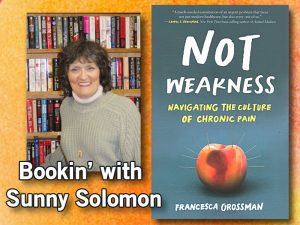‘Weakness’ helps us understand chronic pain
 (May 22, 2023) — “Not Weakness, Navigating the Culture of Chronic Pain” – memoir or self-help?
(May 22, 2023) — “Not Weakness, Navigating the Culture of Chronic Pain” – memoir or self-help?
Is the reader in for 165 pages of whining and sympathy-seeking? Or myriad ways to deal with chronic pain? Or suffering stories from others with illnesses attached to a lifetime of chronic pain? No, to all the above.
The essence of Francesca Grossman’s work is in its title, “The Culture of Chronic Pain:” the medical and social world’s perception of pain. Grossman was asked at a checkup if she had any pain. Her answer: “Nothing acute.” The technician’s response: “So no pain?” Grossman knew “anything under 5 wasn’t worth her (the technician) noting” and anything over 5 would have been taken as “alarmist.”
A nurse with some impatience once told her, post-surgically, “Pain is weakness leaving the body, my love.” Mind you, this was said to a 29-year-old woman, not a child. And there it is: “Not Weakness, Navigating the Culture of Chronic Pain.”
For 26 years, Grossman has kept a journal of her pain and its isolating effects on her professional and personal life, wondering if other sufferers feel the same isolation and, if so, how they deal with it. Fifty million people in the United States live with chronic pain and 70% of that number are women.
“Pain distances us from those we love, igniting cynicism, depression and loneliness.” Through interviews, “Not Weakness” opens the lives of some of those 70% to the rest of us.
I accepted Grossman’s book from her publicist with no promise of a review. But the chapter headings pulled no punches, convincing me I was in: “Silencing: When Suffering Is Dismissed and Ignored; Mental Illness: The Link Between Our Minds and Our Bodies; Fat: Overweight and Underdiagnosed; Wellness: In Pursuit of Our Best Selves.”
Every chapter should be intimately familiar to almost any female reader. The chapter on “Pain Pills: The Line Between Dependency and Addiction” is most personal as a family member with cancer is currently dealing with pain management.
Grossman welcomes all the voices of the women interviewed, and they are as individual as the diseases generating their pain. Their stories of lives put on hold are as admirable as heartbreaking. The author’s commentary on what each respondent shares is steeped in respect and appreciation.
Not surprising to any woman whose complaints have fallen on near-deaf medical ears is the fact that female medical treatment, research and education is still behind that of males. Credit is given where credit is due, but so are the cautionary facts. The medical world needs to listen beyond hearing, and those with friends or family dealing with pain, chronic or otherwise, need to listen with patient and caring ears.
I recommend “Not Weakness, Navigating the Culture of Chronic Pain” to all of us who are a part, knowingly or not, of that culture. And I enthusiastically say it be read before every woman makes her next doctor’s appointment.

Sunny Solomon
Sunny Solomon holds an MA in English/Creative Writing, San Francisco State University. She is a book reviewer for “The Clayton Pioneer” and her poetry and other writing has been published in literary journals, one chapbook, In the Company of Hope and the collection, Six Poets Sixty-six Poems. She was the happy manager of Bonanza Books, Clayton, CA and Clayton Books, Clayton, CA. She continues to moderate a thriving book club that survived the closure of the store from which it began. Sunny currently lives next to the Truckee in Reno, NV.
